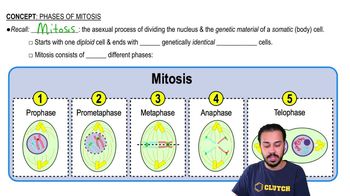Textbook Question
Which of the following phases of mitosis is essentially the opposite of prophase in terms of changes within the nucleus?a. telophaseb. metaphasec, interphased. anaphase
1871
views
 Verified step by step guidance
Verified step by step guidance Verified video answer for a similar problem:
Verified video answer for a similar problem:



 3:21m
3:21mMaster Phases of Mitosis with a bite sized video explanation from Bruce Bryan
Start learning